
You might be surprised, but video games can sharpen your memory and boost spatial skills by traversing virtual worlds. They enhance your decision-making and problem-solving by challenging you to think quickly and adapt. Gaming also improves your hand-eye coordination and can even lift your mood, easing stress and fostering friendships. Plus, it keeps your brain youthful and sparks curiosity. If you keep exploring, you’ll find even more ways gaming benefits you.
Memory Enhancement Through Gameplay
Although you mightn't realize it, playing video games can actually boost your memory. If you’ve ever wondered are video games good for you, one key reason is their ability to enhance memory through strategic gameplay and focused concentration.
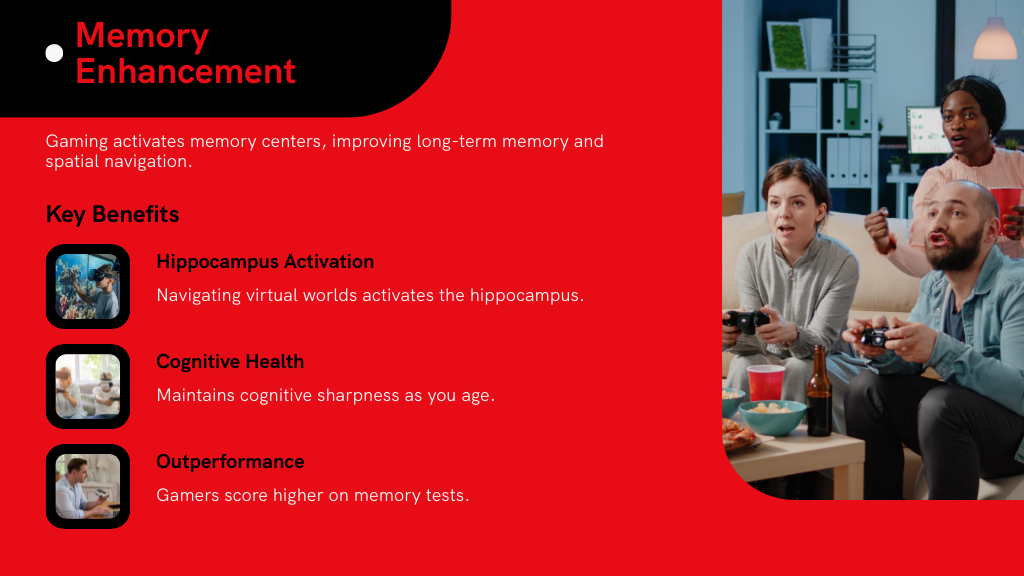
When you navigate complex virtual worlds, your hippocampus—an area essential for memory—gets activated, improving both long-term memory and spatial navigation.
Studies consistently show gamers outperform non-gamers on memory-related cognitive tests, and brain scans confirm heightened activity in memory centers among regular players.
So, why are video games good? Besides fun, they help maintain cognitive health as you age by keeping your memory sharp. This makes gaming not only entertaining but also a practical way to support your brain function over time.
Boosting Spatial Visualization Skills
When you play video games, you’re sharpening your ability to create mental maps and focus your visual attention. This helps you improve your spatial memory, making it easier to navigate and understand complex environments. These skills aren’t just useful in games—they can boost your problem-solving in everyday life and work.
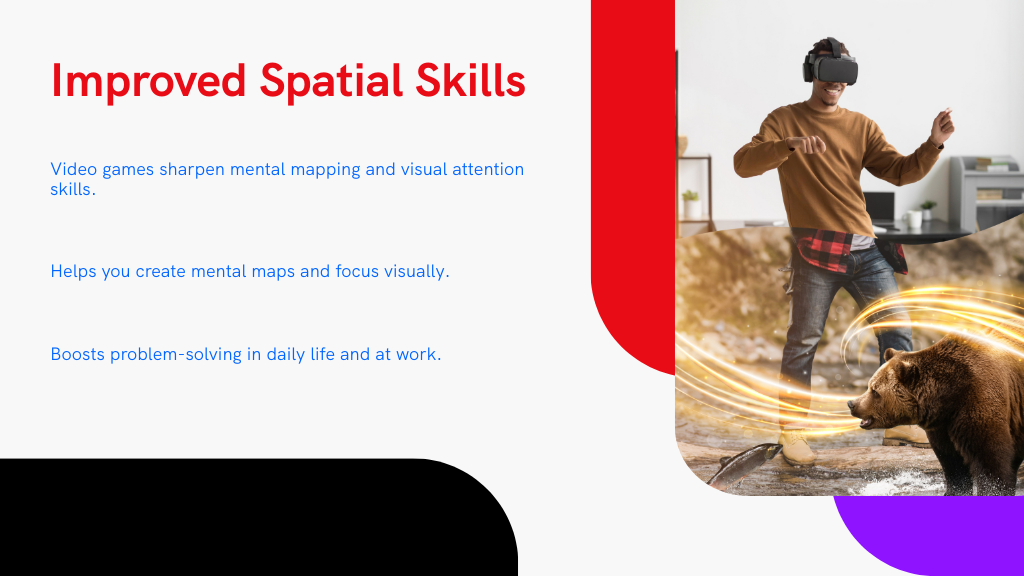
Enhancing Mental Mapping
If you want to sharpen your ability to visualize and manipulate objects in your mind, playing video games—especially action and puzzle types—can help you do just that.
These games enhance your mental mapping skills, making it easier to navigate and understand complex environments. Here’s how gaming boosts your spatial abilities:
- You learn to mentally rotate and manipulate objects, improving your visualization skills.
- You develop a keen sense of spatial relationships, helping you assess environments quickly.
- Your enhanced mental mapping supports better problem-solving and decision-making in real-world tasks.
These improvements aren’t just for fun; they’re valuable in STEM careers and everyday life, where spatial reasoning plays an essential role.
Improving Visual Attention
Since video games demand quick thinking and precise control, they naturally boost your visual attention and spatial visualization skills.
Playing action and strategy games helps you mentally manipulate and visualize objects in three dimensions more effectively. You'll find it easier to perform tasks requiring mental rotation, which is valuable in fields like engineering and architecture.
Studies show gamers excel at tracking multiple moving objects simultaneously, sharpening your ability to process complex visual information. This improves your hand-eye coordination, enhancing real-world spatial awareness and reflexes.
The spatial skills you develop through gaming don’t just stay in the virtual world—they translate to better performance in STEM careers, where strong visualization and spatial reasoning are essential.
Strengthening Spatial Memory
Building on how gaming enhances your visual attention and spatial skills, it also strengthens your spatial memory. When you play video games, especially action titles, you improve your ability to visualize and manipulate 3D objects in your mind. This skill is crucial for real-world tasks like navigation and problem-solving.
Here's how gaming boosts your spatial memory:
- You get better at mental rotation, helping you understand objects from different angles.
- Your hand-eye coordination and timing improve, sharpening your spatial awareness.
- You develop spatial strategies that enhance your ability to navigate unfamiliar environments.
Research shows regular gamers outperform non-gamers on spatial memory tests, proving that gaming is more than just fun—it’s a powerful tool for cognitive growth.
Improving Visual Perception and Eye Coordination
When you play action video games, your brain sharpens its ability to spot subtle differences in shades and patterns, which can help you handle tasks like driving in poor visibility.
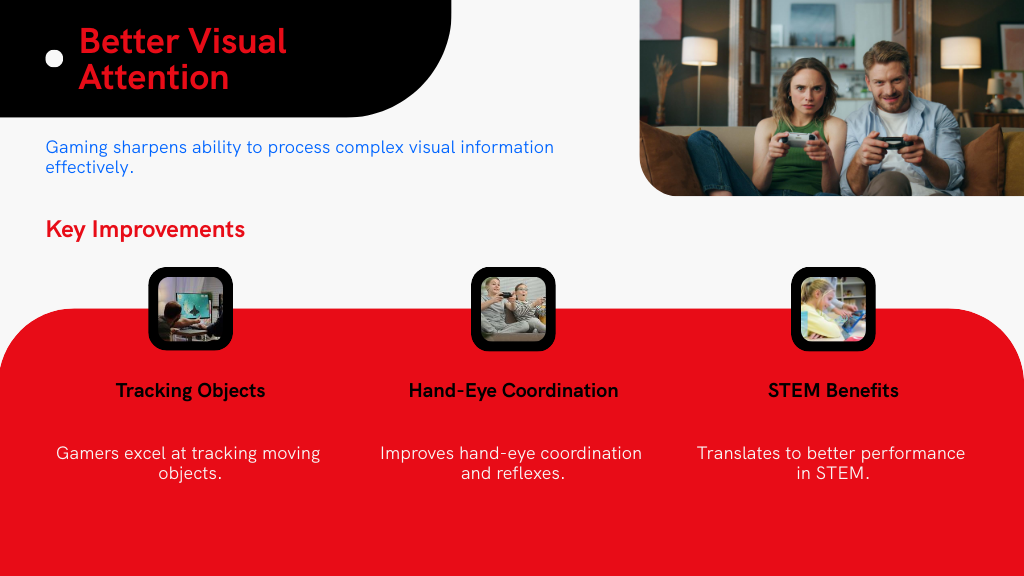
You'll also develop better hand-eye coordination because these games require precise timing and quick motor responses. As you track multiple moving objects and recognize patterns, your visual processing and environmental awareness improve greatly.
This boost in visual attention makes it easier for you to process large amounts of information rapidly. Additionally, your spatial visualization skills get stronger, which not only benefits gaming but also real-life tasks, including those in STEM fields.
Enhancing Decision-Making Abilities
Beyond just sharpening your visual skills, video games also train your brain to make faster, smarter decisions. When you immerse yourself in fast-paced games, you're compelled to react quickly to shifting environments, which boosts your cognitive flexibility.
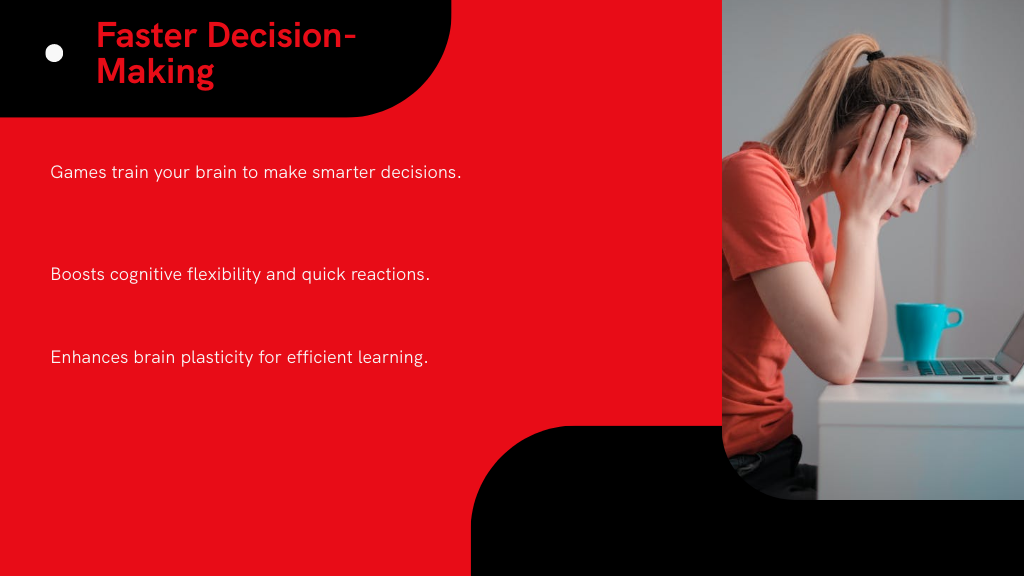
Playing regularly enhances your brain’s plasticity, helping you adapt to new information and learn more efficiently. Here’s how gaming refines your decision-making:
- You prioritize attention and juggle multiple tasks, sharpening your ability to decide under pressure.
- You experience trial and error constantly, building resilience and encouraging smarter choices next time.
- You face dynamic scenarios demanding swift evaluation and action, improving your speed and accuracy in decisions.
All this means your decision-making skills get a powerful workout, benefiting you far beyond the screen.
Strengthening Problem-Solving Skills
Since video games often present complex challenges, they naturally boost your problem-solving skills by pushing you to think strategically and adapt quickly.
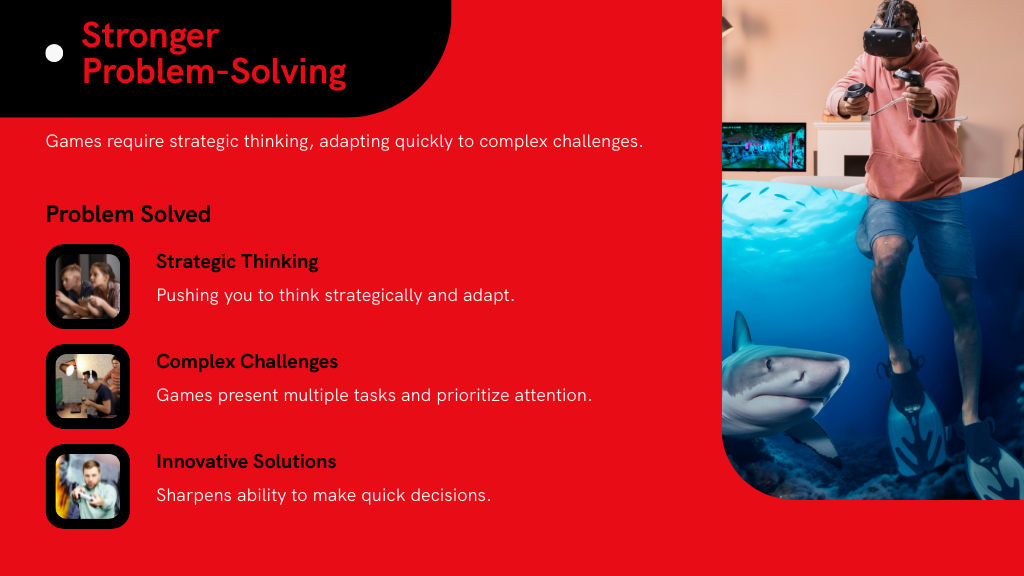
Open-world and mission-based games act as intricate puzzles, requiring you to manage multiple tasks and prioritize attention. This constant mental exercise sharpens your ability to make quick decisions and develop innovative solutions.
Studies show that regular play in strategy games enhances these skills, leading to improved performance both academically and in real-life situations. You’ll find yourself approaching problems creatively, thinking outside the box to overcome obstacles.
Regular strategy gaming boosts creativity and problem-solving, improving academic and real-life performance.
As a result, gamers often achieve better grades and demonstrate stronger cognitive abilities. So, playing video games isn’t just fun—it’s an effective way to strengthen your problem-solving skills.
Elevating Mood and Emotional Well-being
Although video games are often seen simply as entertainment, they can greatly elevate your mood and emotional well-being. When you immerse yourself in gaming, you’re not just playing—you’re also finding a powerful way to manage stress and boost happiness.
Here are three ways gaming benefits your emotional health:
- Stress Relief: 71% of players report feeling less stressed after gaming sessions.
- Emotional Support: Over half of gamers say video games helped them through tough times.
- Mental Stimulation: 75% believe gaming stimulates their mind while providing relaxation.
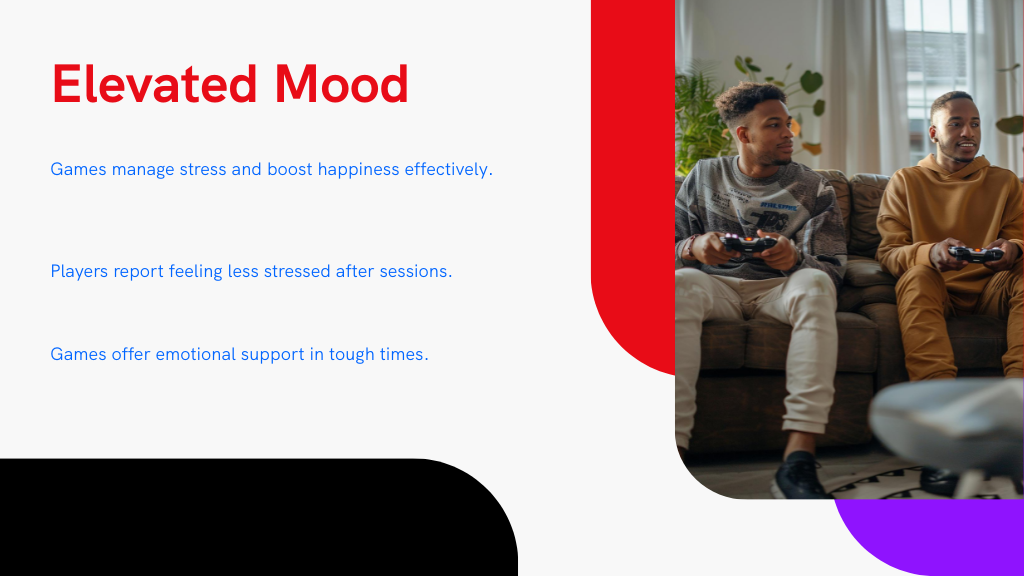
Developing Social Interaction and Communication
When you immerse yourself in multiplayer games, you're not just playing—you’re also sharpening your social skills and building connections.
Over half of gamers worldwide play online with others, using shared interests to form friendships. These games demand teamwork and clear communication, helping you improve how you interact and collaborate.
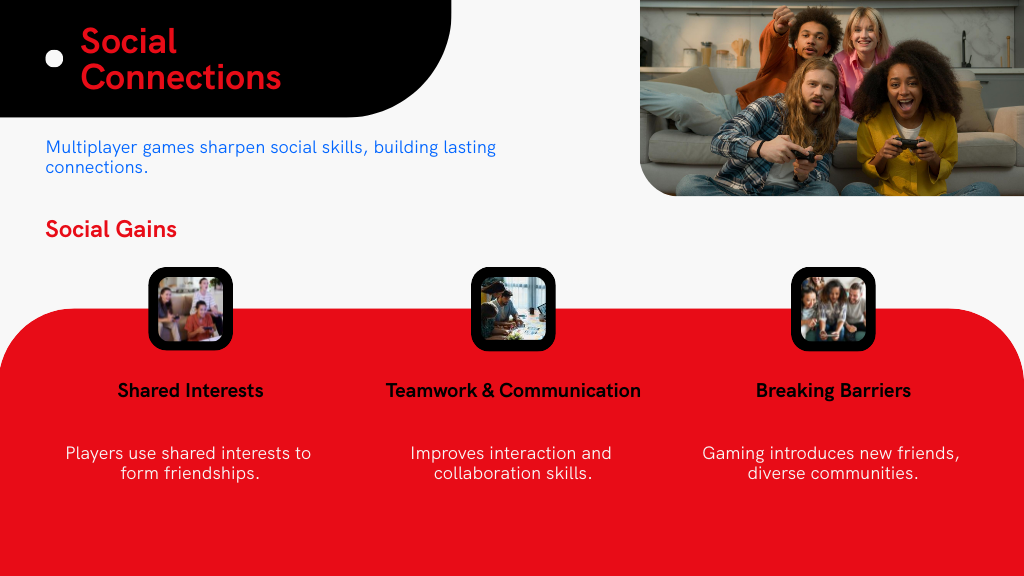
About 67% of players say gaming introduces them to new friends and diverse communities, breaking social barriers. Cooperative gameplay encourages empathy since you rely on others and offer support to succeed. Plus, more than 70% of players game with friends, making it a fun way to strengthen existing relationships.
Increasing Physical Dexterity and Fitness
If you want to boost your hand-eye coordination and manual dexterity, video games can help more than you'd expect. Studies show surgeons who play video games perform procedures 37% more accurately and faster.
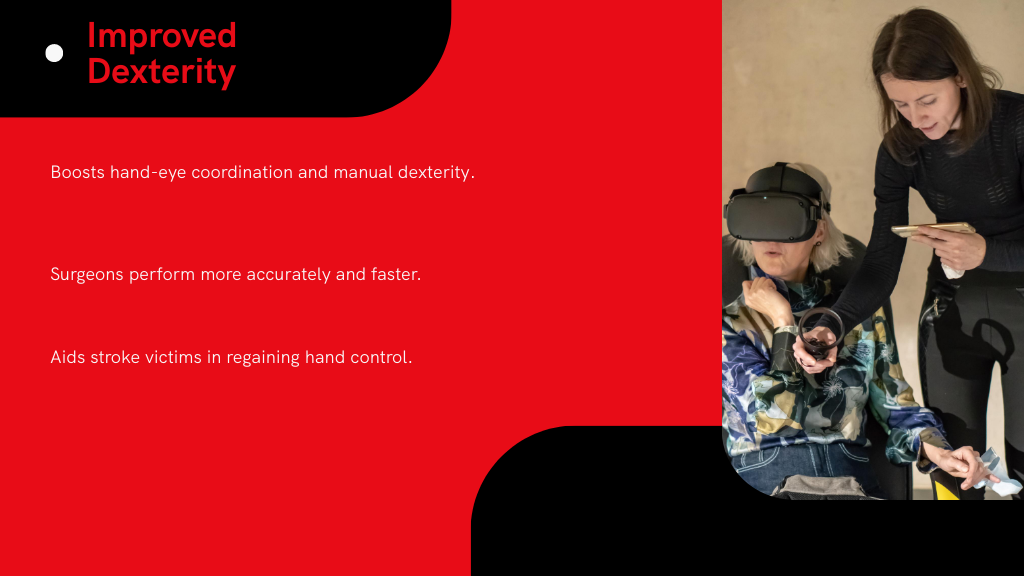
Video games also aid stroke victims in regaining hand control through engaging therapy. Here’s how gaming improves your physical skills:
- Enhances hand-eye coordination, essential for precise timing between visual cues and motor responses.
- Sharpens fine motor skills, which improves your performance in real-world tasks requiring dexterity.
- Boosts reflexes and spatial awareness, skills beneficial in both daily activities and specialized careers.
Beyond improving your physical skills, video games offer significant benefits for your brain’s health and longevity. Playing regularly can increase gray matter, which is essential for movement, memory, and emotional regulation, helping keep your mind youthful as you age.
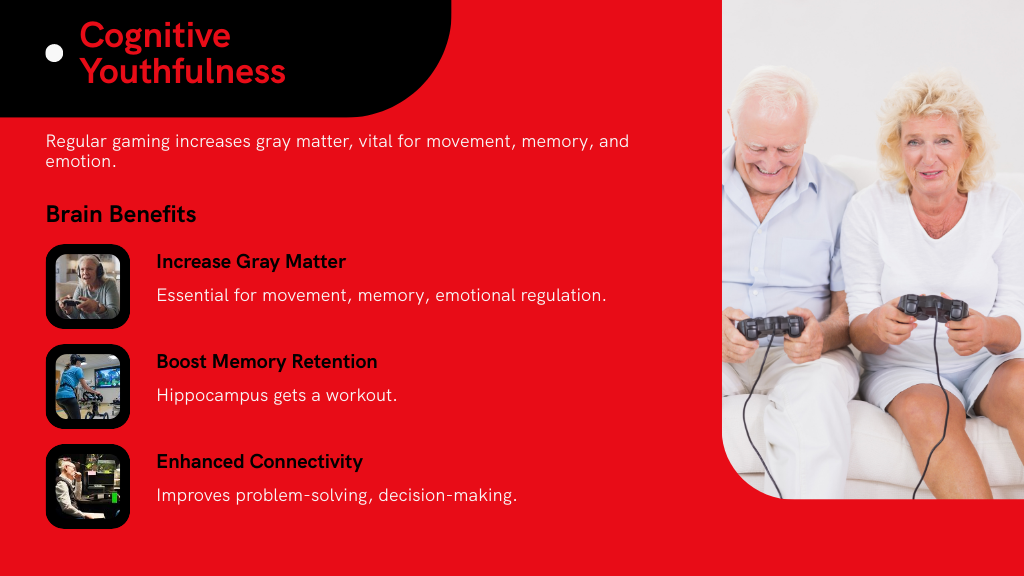
When you navigate virtual worlds, your hippocampus gets a workout, boosting your memory retention. Video games also enhance brain connectivity, improving your problem-solving, decision-making, and multitasking skills.
Older players often notice better focus and cognitive flexibility, showing how gaming supports adaptability in aging adults. The interactive nature of games keeps your brain engaged, promoting sustained mental sharpness.
Fostering Curiosity and Lifelong Learning
Although you might play video games just for fun, they often spark your curiosity and inspire you to learn more. Games introduce you to new stories, concepts, and worlds, encouraging exploration beyond your usual interests. They challenge you to think creatively and solve problems, which fuels a desire to discover innovative solutions.
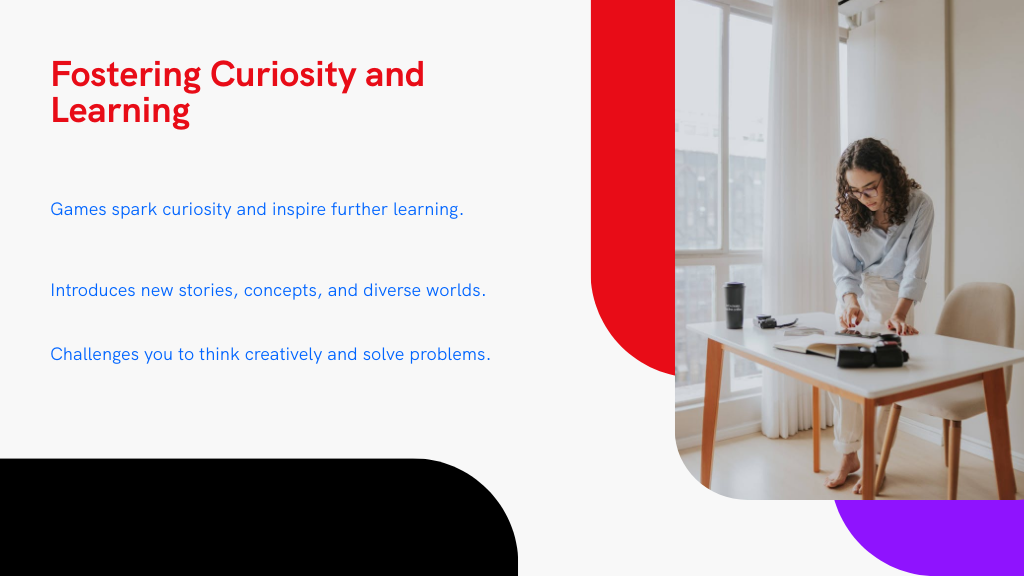
Games open doors to new ideas and worlds, sparking creativity and problem-solving curiosity.
Plus, many games include educational content, helping you absorb historical facts or scientific principles effortlessly.
Here’s how video games foster lifelong learning:
- Immersing you in diverse genres expands your knowledge and adaptability.
- Interactive gameplay rewards creative thinking and problem-solving.
- Educational elements within games promote continuous learning in an engaging way.
Conclusion

So, next time you pick up a controller, remember it’s not just fun—it’s boosting your brain too. Take Emma, a college student who improved her memory and problem-solving skills by playing puzzle games daily. Whether it’s sharpening your decision-making or enhancing social connections, video games offer more than entertainment. They challenge you, keep your mind young, and even get you moving. So go ahead, play smart and enjoy the benefits!

















